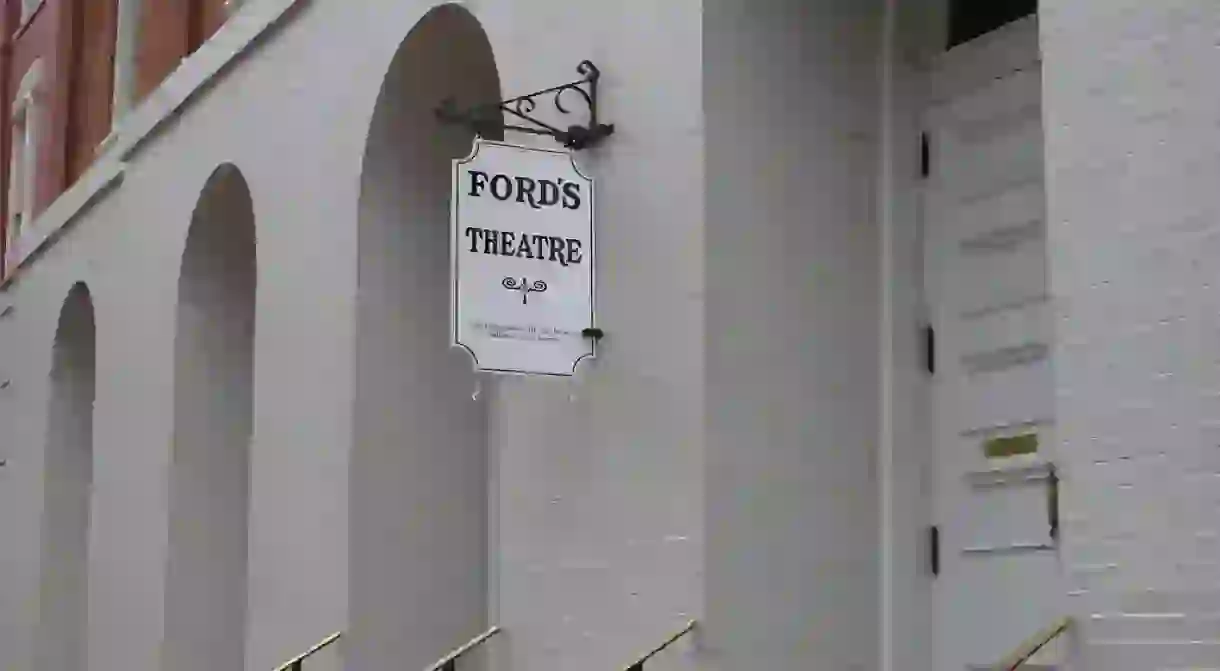A Brief History Of Ford's Theatre

Still in operation, the famed Ford’s Theatre, where Abraham Lincoln was shot, is sandwiched between sprawling DC office buildings. The exact box he sat in, where a bullet fatally pierced his skull, even remains on public view.
Constructed in 1861 but immediately destroyed by fire, Ford’s Theatre was once referred to as a ‘magnificent new thespian temple.’ It sat 2,400 people and opened, successfully this time, in August 1863. It was big, grand, and a gathering spot for Washington elites. It was a theater for the ages, as the country took a new direction. But 150 years ago, downtown DC looked a lot different.

The nation had been at war with itself since the theater’s construction, until General Lee ultimately surrendered at Appomattox Court House on April 9th, 1865. A mere five days after the formal end of The Civil War, Lincoln attended a performance of Our American Cousin at Ford’s Theatre. A figurative weight of the world had been lifted off the president’s shoulders; he was chipper and in the mood for a play. The Secretary of Treasury, Hugh McCulloch, remarked on that day, ‘I never saw Mr. Lincoln so cheerful and happy.’
Senator James Harlan took a drive with Lincoln the prior morning, noting that ‘[his] indescribable sadness which had previously seemed to be an element in his very being, had been suddenly exchanged for an equally indescribable expression of serene joy as if conscious that the great purpose of his life had been achieved.’
The nation had suffered deep wounds, but Lincoln trusted it could be united once again. Unfortunately, Lincoln never lived to see the day. John Wilkes Booth, a respected actor and fierce southern patriot, stormed the presidential box shouting, ‘Sic semper tyrannis.’ (Translation: thus I always bring death to tyrants.) He wished to save the dying confederacy and keep the nation divided; he shot Lincoln at point-blank range, mortally wounding him.

Following Lincoln’s assassination, Congress prohibited the theater from ever again being used as a ‘place of public amusement.’ The Military resumed control of Ford’s Theatre, demoting it to a clerk’s office for the Department of War. The once iconic theater was primarily used for little more than filing for twenty years.
But in 1893, the building partially collapsed, and twenty-two clerks were killed. Scores of others were injured. Many assumed the building was haunted, as it continued to be shrouded in death, and it remained vacant until 1928. The National Park Service obtained control and converted Ford’s into a Lincoln museum.
After extensive 20th century lobbying, Congress approved funds for a complete restoration in 1964. The historic landmark underwent another extensive renovation in the early 21st century, and President Obama officiated the re-opening in 2009.
Ford’s Theatre has witnessed great tragedy, and great determination to restore it. It continues to host plays and a variety of performances, the ultimate testament to the spirit of the nation’s perseverance. The theater lives on, even if the president doesn’t.














